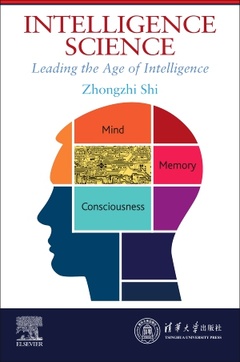Intelligence Science Leading the Age of Intelligence
Auteur : Shi Zhongzhi

Intelligence Science: Leading the Age of Intelligence covers the emerging scientific research on the theory and technology of intelligence, bringing together disciplines such as neuroscience, cognitive science, and artificial intelligence to study the nature of intelligence, the functional simulation of intelligent behavior, and the development of new intelligent technologies. The book presents this complex, interdisciplinary area of study in an accessible volume, introducing foundational concepts and methods, and presenting the latest trends and developments. Chapters cover the Foundations of neurophysiology, Neural computing, Mind models, Perceptual intelligence, Language cognition, Learning, Memory, Thought, Intellectual development and cognitive structure, Emotion and affect, and more.
This volume synthesizes a very rich and complex area of research, with an aim of stimulating new lines of enquiry.
1. Introduction2. Foundation of neurophysiology3. Neural Computing4. Mind model CAM5. Perceptual Intelligence6. Language cognition7. Learning8. Memory9. Thought10. Intellectual development and cognitive structure11. Emotion and affect12. Consciousness13. Brain machine integration14. Brain-like intelligence
- Presents a complex, interdisciplinary area in an accessible way, including the latest trends and developments
- Brings together disciplines such as neuroscience, cognitive science and artificial intelligence
- Gives the latest methods and theories in the development of new intelligent technologies
- Reflects upon the most important achievements in the study of natural and artificial intelligence
- Contextualizes intelligence research within the history and progress of twenty-first century science
Date de parution : 04-2021
Ouvrage de 632 p.
15x22.8 cm
Thème d’Intelligence Science :
Mots-clés :
?ABGP agent; ACT-R model; ART model; Abductive inference; Action potential; Affective computing; Analogical inference; Artificial intelligence; Attention; Auditory pathway; Back-propagation; Bayesian linking field model; Big issues; Bilingual brain; Brain; Brain science; Brain-like intelligence; CAM model; Causal inference; Cerebral cortex; Cognitive cycle; Cognitive intelligence; Cognitive learning; Cognitive machine learning; Cognitive science; Cognitive structure; Collaborative decision-making; Complementary learning; Computer integration; Computer interface; Conscious Turing machine; Consciousness; Consciousness system; Deductive inference; Deep learning; Development roadmap; Ecology theory; Electroencephalogram; Emotion intelligence; Emotion model; Emotion pathway; Emotion theory; Emotional quotient; Environmental awareness; Episodic memory; Formal grammar; Genetic epistemology; Gestalt theory; Global workspace theory; Hierarchical temporal memory; Hieratical model of thought; Human Brain Project; Human learning; Humanistic learning; In-memory computing; Inductive inference; Information integration theory; Intelligence; Intelligence development; Intelligence quotient; Intelligence revolution; Intelligence science; Introspective learning; Ion channel; Language cognition; Language understanding; Learning theory of behaviorism; Long short-term memory; Long-term memory; Machine learning; Membrane potential; Memory; Memory system; Memristor; Mind model; Morphism-category theory; Natural language processing; Nervous system; Neural column; Neural computing; Neural field model; Neuromorphic chip; Neuronal group selection; Neuroscience; Neurotransmitter; P300; PMJ model; Perceptual intelligence; Physical symbol system; Quantum theory; Recurrent neural networks; Reductionism; Reinforcement learning; SOAR model; Second messenger; Semantic memory; Short-term memory; Speech recognition; Synaptic learning rules; Synaptic transmission
